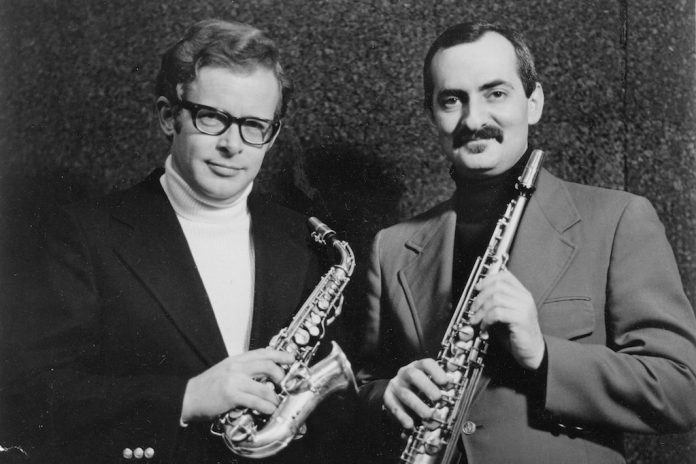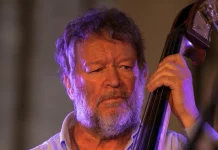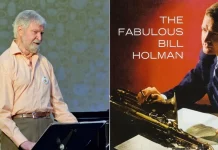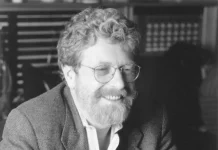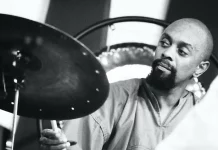Like many long-lived musicians, Bob Wilber’s career spanned several stylistic eras. During more than six decades he accommodated change without losing sight of his musical foundations and neither did he adjust his very high standards. Not only performing, he also composed and was active in jazz education.
He was born Robert Sage Wilber in New York City, 15 March 1928. Raised in Scarsdale, New York, at the start of his teens he studied clarinet with Willard Briggs and upon graduation from high school in 1945, was briefly at the Eastman School of Music. He abandoned this in favour of mastering his chosen trade through listening to and playing with jazz musicians in New York City.
Also in 1945 he formed the Wildcats, and worked with other young musicians who would go on to professional careers in jazz, among them pianist Dick Wellstood and trombonist Ed Hubble. The Wildcats recorded in 1947 and played regularly at Jimmy Ryan’s where Wilber heard and sat in with many major figures of early jazz, among them Wild Bill Davison, Baby Dodds, Bud Freeman and Pee Wee Russell.
This same year, still in his teens, he studied with Sidney Bechet, an association that led to his taking up soprano saxophone, the instrument that Bechet had effectively made his own in the jazz world. Around this time he also recorded with Bechet, a man not known for his tolerance of musical inferiors, which gives an indication of the high standards the young musician was already achieving. Indeed, Bechet appears to have been instrumental in urging Wilber to play at Nice’s first international jazz festival in 1948.
Wilber’s music at this time was rooted in traditional jazz but his mind was open to change and he also studied with Lennie Tristano. Thus his recordings of the 1950s find him playing in both traditional and modern styles. Although musically sound, this was not especially successful commercially as audiences of the time tended to be vehemently pro one style and anti the other.
Through the 1950s and 1960s, Wilber continued to lead his own bands and also played and often recorded with major figures, among them Eddie Condon, Benny Goodman, Bobby Hackett and Jack Teagarden. At the end of the 1960s he was a member of the newly created World’s Greatest Jazz Band and when the 1970s began he teamed up with fellow soprano saxophonist Kenny Davern to form Soprano Summit. Hugely successful on record and on international tours, this band lasted until the end of the decade and he quickly followed it with his Bechet Legacy band.
Among other activities he served as musical director of the Smithsonian Jazz Repertory Ensemble and as leader of the house band at a number of Duke Ellington conventions. In 1978 he appeared in Europe with the WGJB’s latest edition, which included an appearance at the Middlesbrough jazz festival. It was during this tour that he married singer Joanne “Pug” Horton who thereafter frequently sang with his bands.
In 1984 Wilber worked on recreations of Ellington’s music for The Cotton Club and in 1988 he brought back echoes of Benny Goodman’s band for anniversary performances of the 1938 Spirituals To Swing Carnegie Hall concert. Also in the 1980s he led the Widespread Depression Orchestra. His autobiography Music Was Not Enough (in collaboration with Derek Webster) was published in 1987. In the 1990s Wilber and Davern reformed Soprano Summit, touring and recording, and he played on Flip Phillips Celebrates His 80th Birthday At The March Of Jazz 1995. He continued to record, late albums coming in 2010 and 2011, and in 2014 he led the Crescent City Cats (with Pug Horton) in concert at the New Orleans Jazz and Heritage Festival.
Long resident in the UK, Wilber maintained his enthusiasm for music, in particular seeking ways to interest young audiences in the styles of yesteryear, achieving this without adhering slavishly to outmoded concepts. He was an outstanding instrumentalist and one of very few musicians who made the soprano saxophone his principal choice although he did play clarinet and alto saxophone. In his case he preferred the curved version of the soprano, not the straight form. As a soloist he was at least the equal of Bechet and Davern, always melodic and graceful and intensely musical in all that he did. Bob Wilber, who had lived for several years in Chipping Campden, in England’s Cotswolds, died on 4 August 2019.

